#no epilogue - this is not a story of triumph or victory -> this is very very bad and i am not happy >:(
Explore tagged Tumblr posts
Text
Personal take: One of the weirdest things Veilguard did, outright baffling, in fact, is how it feels like they reset the status quo of the world to Origins - even further back, if anything.
The game avoids (at all costs) meaningfully delving into exploring what these events/lore reveals mean to the world and characters at large. But the entire time I was thinking: holy shit this is bad.
What happens in game has very, very bad implications for the rest of Thedas and how they're going to look at groups like the Elves and Mages. I'm looking at this from the perspective of someone whose played all three previous games, not from the perspective of datv which really brushes over all moral complexity and sociopolitical issues. Of course, it's just my interpretation but its based off what happened in previous games.
Elves
The Elvish Gods of legend came back, blighted, and ended up wiping out the majority of the South - I find it hard to believe that the elves would not be 'roped in' as being responsible somehow.
Elves could sneeze in a previous game and people would blame them for causing a plague and purge the alienage -> life is shit for an elf and the events of datv would have absolutely made life a thousand times worse.
Would there be purges of alienages? Are there groups like the chavaliers or mobs of humans going about an killing elves because 'It's your Gods. It's your fault.'
Obviously, it isn't. But there are plenty of examples in Thedas' history of people acting rashly/cruelly out of terror and anger - and it's the most vulnerable people, like the Elves and Mages, who are targeted.
The Dalish Elves, what remains of them, would likely be perceived as 'Blight/Old God worshipers' - people would chase them off for the 'crime' of living too close to them in the woods in DAO.
Terrified, angry people would not care if the Dalish said they had nothing to do with what's happening - there would be bloodshed.
If anything improved for the elves from the time of Origins -> Mahariel, Tabris, Lavellan, or Briala...it's likely back to ground one as the best possible outcome, and closer to the Exalted March on the Dales at it's worst.
Mages
Mages could, potentially, have been living a life of unprecedented acceptance if Leliana was Divine -> along come the Evanuris, mages, who are allied with the Venatori who are causing devastation in Orlais and the Free Marches specifically.
Missive - Message from the Front -> The Tide Turns "The Venatori and the Orlesian royal armies clash daily in Orlais. Val Royeaux is now under control of the rebels, and from there the Venatori launch attacks as far east as Kirkwall."
The original magisters (evanuris) wielding the Blight and Old Gods 2.0 x2.
Any templars who remained, who had the old mindset and outlook of how mages should be treated, absolutely would be pointing at the venatori and saying "we warned you what would happen without the Order."
Normal people wouldn't give a shit that it's only a 'few' mages -> their entire home is gone, their families are dead, and the people responsible are wielding magic.
Fear of magic would likely be at an all time high - If the Order doesn't exist people would likely be demanding for them to come back.
The mages - whatever goodwill they earned - are likely being faced with suspicion and terror because this is proof of what magic can do in the hands of power-hungry douchebags.
Maybe they help to fight and people don't get so suspicious of them - who knows! This game doesn't want to address the previous games so it's in limbo.
Spirits
Other people have done great posts about how the spirits were completely tossed aside in this game. Three games worth of humanizing spirits, with Justice and Cole, only to go back on it with Solas reinforcing the Veil and...maintaining the status quo?
He so earnestly discussed with us his perspective on spirits and how they're just as 'real' as those on this side of the Veil - we saw it with Cole firsthand. But I guess they can all chill in the Fade till Solas dies or whatever.
I'd argue that the elves and mages are in an even worse position than they were in Origins. It's just not fulfilling, to me at least, to see the World I got so invested in just regress to the status quo after three games of challenging it. For it to not be meaningfully discussed or spoken about in-game, just brushed aside...I may not have liked the decision to do this but it could have been interesting (at least) if they actually discussed it.
Also, people don't just 'band together' because of the Blight - Origins showed us very well that in times of strife and pressure peoples petty/deeply ingrained beliefs, prejudices, and values come to the forefront. Alistair's comment about “You know, one good thing about the Blight is how it brings people together" -> was him being snarky about how everybody as Ostagar was on the verge of throwing hands with each other. They were united in cause not in belief - the cause being to eradicate the darkspawn.
It's just so grim, and with how they handled sociopolitical issues and moral complexity in datv (not at all) I have no hope that they'll be able to address this at all, if they even bother to and don't just...ignore it, I guess.
Maybe this is what the devs meant when they said that the 'tone' was similar to Origins - just straight up erasing whatever strides was made in the previous games and setting it back to square one lmao
#i will never stop thinking about southern thedas bioware - yes i probably am thinking about this too hard#no epilogue - this is not a story of triumph or victory -> this is very very bad and i am not happy >:(#hard to put into words the empty feeling i got in my stomach when the game ended#i'd argue that the elves are worse off than origins - way worse off. like closer to exalted march of the dales quo than origins quo.#not to mention the Crows remaining the same and the Tevinter still slaving away#I guess the wardens get to retire now though - so we got one win? lmao#actually back to the Crows - Zevran being erased and the crows 'winning' means they're actually better off -> yay?#once more -> it's my opinion - maybe ur look isn't as fatalistic as mine but this is very grim to me :(#datv critical#bioware critical#veilguard critical
179 notes
·
View notes
Text
⌜Catch Me If You Can | Chapter 20 Chapter 20 | EPILOGUE: the thief and the messenger⌟
╰ ⌞🇨🇭🇦🇵🇹🇪🇷 🇮🇳🇩🇪🇽⌝



❘ prev. chapter ❘༻✦༺❘ next chapter ❘

Weeks later, you found yourself perched on the slanted roof of your favorite hideout—the very one spot in town where you felt truly invisible. It was also the same place where you had once laid out your bold plan to rob a god.
Now, you sat cross-legged, a freshly swiped apple in hand, watching the sun dip lower in the sky.
The fading light bathed the horizon in hues of gold and crimson, streaks of orange blending into soft purples that hinted at the coming night. Above, the first stars began to twinkle, tiny pinpricks of silver against the deepening blue.
You bit into the apple, the crunch loud in the quiet. The faint scent of smoke and rebuilding filled the air, mingling with the sweet tang of the fruit.
Below, the town bustled faintly—quieter than it once had been, but alive in a way it hadn't been for a long time.
You watched as lanterns began to flicker to life, dotting the streets like fireflies. The people were rebuilding, healing.
It wasn't perfect, but it was better.
Life had returned to normal—or at least as normal as it could be for you. A small smile played at your lips as you thought back to everything that had happened.
You were richer from the experience—not just in the extra gold that mysteriously appeared in your satchel after you parted ways with Hermes, though that certainly helped. It even came with a note written in an elegant, teasing hand: For your trouble. Don't spend it all in one place, little thief.
The tyrant who had taxed your town into despair was gone now, driven out by the unexpected surge of wealth that allowed the people to reclaim what was theirs.
The Sunstone had done its part, not as a stolen artifact, but as the spark that inspired change.
And though you doubted Apollo would ever forgive the theft, he hadn't come back to smite you yet. Small victories.
You glanced up at the stars, their light growing brighter as the sun's warmth faded.
Your fingers brushed against the faint, golden mark on your wrist—the lingering proof of Apollo's judgment. It no longer burned, but it tingled faintly sometimes, a reminder of the divine forces you had crossed. A reminder that you had survived.
Taking another bite of the apple, you let your thoughts wander back to Hermes. You hadn't seen him since that night, but his parting words still echoed in your mind, as did the maddening, fleeting warmth of his kiss. "But if you do... well, you know where to find me."
You shook your head, letting out a soft huff of laughter. Typical Hermes. Always leaving you guessing, never giving you the full story. But even so, you knew you'd see him again. Trouble had a way of finding you, and he was never too far behind it.
For now, though, you allowed yourself to savor the moment—the peace of your town rebuilding, the quiet triumph of surviving a brush with the gods, and the soft glow of the stars above.
Whatever came next, you'd be ready.
For now, your thoughts wandered to the mundane, grounding you in the moment. What should I eat later? you mused, chewing the last bite of your apple. Maybe head to the bar for some stew... or catch the baker's stall before it closes. That honey bread is—
"Awfully quiet, little thief. Miss me already?"
The voice cut through your thoughts like a knife, smooth and teasing, laced with unmistakable amusement. Your heart leapt into your throat, the familiar timbre as jarring as it was strangely comforting.
Slowly, you turned, and there he was—Hermes.
He lounged casually on the edge of the rooftop like he belonged there, his wings faintly visible in the soft light of the evening, shimmering faint gold at the edges. His grin was as maddeningly smug as you remembered, his golden eyes glinting with a mixture of mischief and curiosity; his posture relaxed like he didn't have a care in the world.
Your chest tightened for a moment—a small, fleeting reaction that you quickly shoved down, replacing it with a blank, unbothered expression. "Look what the wind dragged in," you deadpanned, crossing your arms as you leaned back against the roof. "What do you want, Hermes? Last I checked, I haven't stolen from any gods recently."
His grin widened, the kind of grin that made you want to throw something at him. "Oh, I don't doubt that. Not yet, anyway." He leaned closer, balancing effortlessly on the slanted roof as his wings folded neatly behind him. "But who's to say you won't? I thought I'd check in, you know, keep you out of trouble."
"Keep me out of trouble?" You snorted, raising an eyebrow. "Isn't that your specialty, oh mighty god of mischief?"
"Guilty as charged." He placed a hand over his chest as if accepting the title with pride. "But let's not forget—you're my favorite little troublemaker now. Makes me feel responsible." His smirk softened, just a fraction, and for a moment, his gaze lingered on you. "Can't have you running wild without supervision."
You rolled your eyes, but there was no stopping the small twitch at the corner of your lips. "I'm doing just fine, thanks. And for the record, I'm not planning on any heists anytime soon."
"Good," Hermes said, his tone lighter but with a faint undercurrent of something deeper—something you couldn't quite place. "That's a start." Then, as if unable to resist, he added, "Though I have to say, the world's a little duller without you stirring the pot."
Your heart raced again, but you masked it with a huff, tossing the apple core off the roof and watching it disappear into the shadows below. "Well, sorry to disappoint. I'm retired from participating in big jobs."
"Retired?" Hermes laughed, a sound so rich and warm that it almost disarmed you. "Well, that won't do at all."
You narrowed your eyes, suspicious. "What won't do?"
Hermes crossed his arms, leaning lazily against his staff. "You. Sitting here. Pretending you're done with all the fun stuff. That's not the little thief I know." His wings shimmered faintly before disappearing once more, leaving only the faintest ripple in the air behind him. "As it happens, I've got something for you. Bigger, shinier, and far more dangerous than the Sunstone. Interested?"
You raised a brow, lips curving into a skeptical smirk. "And what if I don't want to? As you can see, I've got a reputation of simple thievery to maintain here." You gestured down at the bustling town below, the marketplace still lively with traders and customers.
Hermes' smirk widened, and before you could blink, he floated forward, his sandals skimming the edge of the roof. He plopped down in front of you, so close that you had to crane your neck to look up at him. His golden eyes gleamed as he leaned just a little too close for comfort—or maybe too close for your own good.
You hated the way your heart stuttered at something so simple, so deliberate.
"Oh, on the contrary, little thief," he purred, his voice low and smooth, sending a small shiver down your spine. "I apologize if I made it sound like you have a choice. I'm merely here to cash in a deal I'm owed... or did you forget?"
You maintained your snarky look, raising an eyebrow as if unfazed, but inside, you were screaming. Forget? How could you forget? You'd practically replayed the deal on loop every day after you parted ways, trying not to admit—even to yourself—that the silence left behind had felt... lonely.
Finally, you pursed your lips, determined to hide the smile threatening to creep onto your face. "Why are you so insistent on that deal? I know I'm not the only human you've made a deal with. What's in it for you?"
Hermes tilted his head, his grin lazy and entirely too self-assured. "Entertainment, of course," he said with a wink, his tone dripping with charm. "And maybe your charming company."
You rolled your eyes, but the flutter in your chest refused to be ignored. "Charming, huh? Sounds like you're buttering me up for something."
"Always," Hermes said with a playful shrug, standing to his full height and stretching his arms overhead, his grin never faltering. "But come on, little thief. You can't tell me you've been satisfied with the small-time cons down there. Where's the thrill? The excitement? The chaos?"
You opened your mouth to argue, but no words came out. As much as you hated to admit it, he wasn't entirely wrong. Life had returned to normal—or as normal as it could be—but part of you missed the wildness of the journey, the danger, the feeling of being alive.
Hermes must have caught the flicker of hesitation in your eyes because his grin widened, triumphant. "See? You're already considering it."
"I didn't say anything," you shot back quickly, crossing your arms. "You're imagining things."
"Am I?" Hermes' voice dropped slightly, his gaze locking onto yours. "Tell me this, my little thief—when was the last time you felt like you were really living?"
You huffed, turning sharply on your heel. You hated how easily he could read you, but you also couldn't deny the truth in his words. "I don't know," you drawled, keeping your back to him for effect, pretending to mull it over. "Maybe I did. Maybe I didn't. Hard to say."
Behind you, Hermes chuckled, the sound low and teasing. You heard the faint rustle of his sandals against the roof as he moved closer. Too close. The air shifted, and you could feel his presence just behind you—warm, magnetic.
Slowly, you turned, only to find his face mere inches from yours.
His golden eyes lidded slightly, their usual mischief softened into something more dangerous. His lips curled into that infuriating smirk, and the faint breeze ruffled his hair, catching glints of gold in the strands.
He tilted his head, his gaze flickering to your lips for a fraction of a second before locking back onto your eyes.
"Come on~," he murmured, his voice a low, teasing hum that sent shivers down your spine. "Admit it. You missed me."
Your heart pounded in your chest, but you refused to let him win. This time, you leaned forward, closing the gap. Hermes' smirk faltered, his eyes widening slightly as you pressed a teasing kiss to his lips—light, brief, but just enough to leave him stunned.
When you pulled back, it was with a smirk of your own. "Maybe a little."
For the first time, Hermes seemed caught off guard. His eyes blinked rapidly, like he was trying to process what just happened. Then he threw his head back and laughed, the sound bright and full of life, echoing into the night.
"You're going to be the death of me, little thief," he said, his voice still carrying that unmistakable amusement.
You tilted your head, feigning a thoughtful expression as your lips curved into a playful grin. "Well, if you die, who's going to provide me with all that 'entertainment' you promised, huh? Don't go making empty threats, Hermes."
His laughter faltered, the smirk on his lips twisting into something sharper. Before you could blink, his hand shot out, fingers curling around your wrist as he pulled you closer. The sudden movement sent your heart racing, and the teasing retort you'd been crafting evaporated as he tugged you flush against him.
"Empty threats, huh?" he murmured, his voice low and molten, golden eyes locking onto yours with a heat that made your breath hitch. His free hand came up to cup your jaw, his thumb brushing against your cheek.
Then, without warning, he leaned in and crashed his lips onto yours.
The kiss was anything but gentle. It was consuming—fierce and unrelenting, his mouth moving against yours like he'd been waiting for this moment far longer than you could've guessed.
His lips were soft, yet the pressure was firm, claiming, stealing your breath as his hand slid from your jaw to the back of your neck, pulling you even closer.
His tongue flicked against your lips, coaxing them apart, and before you knew it, he was deepening the kiss, his tongue sweeping into your mouth with a skill that left you lightheaded.
Your hands instinctively shot up—one gripping the front of his tunic, the other bracing against his chest. The faint hum of his laughter rumbled against your lips as if he knew exactly what he was doing to you.
When he finally pulled back, you were gasping for air, your head spinning. "W-Wow," you breathed out, your voice unsteady. One hand pressed lightly against his chest as if to put some distance between you, though you couldn't bring yourself to push him away completely. Your fingers brushed against the warmth of his skin beneath the fabric, and it was enough to send another jolt through your already frayed nerves.
Hermes' grin returned, cocky and entirely too pleased with himself, though there was a softness in his golden eyes that hadn't been there before. "Sure you're not the one who's going to be the death of me?" you teased, managing a weak smile despite your flushed cheeks and racing heart.
He snorted, the hand on the back of your neck sliding up to cup your cheek. "Nah, I've got it all figured out," he said, his voice warm and rich with amusement. "If you do die, I'll just bring you back to life. I've got a few connections in the Underworld, you know. I can even make a cozy little alcove just for us if you want—eternity's a lot less dull with you around."
You leaned back slightly, still catching your breath as the warmth of his touch lingered on your skin. "Alright, enough flirting," you said, though the teasing edge in your voice didn't quite mask the fluttering in your chest. "What's this little 'job' of yours anyway? If I'm risking my life again, I'd at least like to know what I'm getting into."
Hermes' grin widened, full of mischief as he tilted his head, watching you like you were the most entertaining thing in existence. "Ah, now there's the spirit I love to see. And here I was worried you'd grown boring."
You arched a brow, waiting, as he clapped his hands together and began patting his pockets. "Let me just grab the details..." His voice trailed off as his golden eyes flicked downward, a frown tugging at the corners of his lips. "Huh. I could've sworn it was—"
When he looked up, his words faltered, his gaze narrowing as he spotted the slip of parchment pinched between your fingers. You held it up with a sly smile, shrugging innocently. "Sorry. Old habits die hard," you said coyly. "You really should keep a better eye on your stuff."
For a moment, Hermes just stared, and then that infuriating grin spread across his face. "Oh, you little—" He didn't finish. Instead, he reached up, pulling his cap off and plopping it unceremoniously onto your head. It tilted slightly, too big for your head, but it only made his smirk grow wider as he grabbed you by the waist and pulled you flush against him.
"You know," he murmured, his voice low and warm, "I think you're going to be my favorite assistant. Try not to let it go to your head."
Before you could respond—or swipe the cap right back off—he unfurled his wings in one smooth motion, the sudden rush of air making your hair whip wildly. His grip on you tightened as he launched into the sky, the ground vanishing beneath your feet.
You let out a surprised yelp, clutching onto his shoulders instinctively, and Hermes' laughter echoed in your ears.
"Hold on tight, little thief," he called over the wind, the stars stretching out like a glittering blanket above you. "The world's wide open now—ripe for chaos, a little adventure, and who knows? Maybe even a bit more love if you're up for it?"
You couldn't help the grin that spread across your face as you tucked your face into his neck. The night swallowed you both, the endless horizon promising more than you could ever imagine.
With Hermes at your side—or rather, holding you aloft—you were ready for whatever came next.

A/N: AHHHHH, y'all!! it's finally finished! i had a lot of fun with it, and it also taught me that i don't have to go wild and every book i write gotta have 30+ chappies.... i als tried my hand here at a faster-paced romance (which was hard asf because it takes me hella long time to even realize i like someone, let alone wanna kiss them lolol---sighs, life of a demisexual) enough ramling, hope you lovelies enjoyed this! my apollo or telemachus short fic should be dropping soon~ in the mean time, while updating KNE and Godly Things oneshots will be drpping as well ❤️
#xani-writes: cmiyc#epic the musical#epic the ocean saga#epic the musical fanfic#jorge rivera herrans#epic the musical x reader#greek mythology#greek gods#etl#x reader#greek gods x reader#hermes x you#hermes x reader#hermes#hermes etm#hermes epic the musical#reader insert#trickster god#messenger god#romance#fem reader#x female reader#ao3#ao3 fanfic#wattpad#quotev
89 notes
·
View notes
Text
Driven by Speed: A diamond among stones - Epilogue
------------------------
The Unstoppable Series - Masterlist
Part 1: A Diamond among stones

Prologue
F1 start
Loss and Pain
Calm after the storm
First victory
Unbreakable
Unexpected blow
The Secret
Beginning of New Era
The Burden of a Leader
Sad Anniversary
Unexpected feelings
Hungry Eyes
The Infernal Race
Kiss from A Rose
I shouldn't
Wicked Game
They would be Proud of You
Unstoppable
This is the Beginning
Epilogue
---------------------------
Warnings: long (very long) slow burn, age gap (23 years), woman racing in F1, boss/driver relationship, difficult and painful past, death, anxiety,
---------------------------

Epilogue
Abu Dhabi, December, morning, hotel
POV Miriell
Dawn spills across the sky like golden ink, and I stand on the balcony of my hotel room, inhaling the salty scent of the sea. The wind gently tugs at my hair, and the last stars fade against the brightening horizon.
I close my eyes.
A few hours ago, the crowds were chanting my name, thousands of hands lifting me in the euphoria of victory. For a moment, I felt immortal—like the world belonged to me, like I could capture eternity in a single heartbeat.
Now, there is silence. A silence that wraps around me like a familiar, almost forgotten touch.
My whole life has been a fight. For my place, for the right to dream, for every second on the track. Nothing ever came easy—I had to claw for everything, fighting against the world, against myself, against anyone who ever doubted I could do it.
But today… today, I don’t have to fight anymore.
Today, I am a champion.
I open my eyes and gaze into the distance. For a moment, I close them again, but I don’t see the trophy.
I see my grandfather Eryk, the first to put me in a go-kart, proudly telling me that racing was in my blood. I hear his laughter, feel the warmth of his hand, though so many years have passed. I see Susie and the unwavering belief in her eyes. I see Jack, laughing in his mother’s arms, spinning small circles with an imaginary race car.
This title is for them. For those who are no longer here but whose love I carry in my heart. For my grandfather, who taught me that strength doesn’t mean the absence of weakness. For Susie, who believed in me more than I did myself. For Jack, who should have grown up in a world full of joy and laughter.
This title is for him… for Toto.
Though I will never say it out loud, I know that without him, I wouldn’t be here today.
He was my lighthouse when I lost my way. My support when everything inside me was breaking. My silence when I didn’t need words, only presence.
I can still feel the warmth of his hand on my back. I hear his whisper in my mind: Goodnight, my champion…
The silence embraces me like a soft blanket, but it is not lonely. It is peaceful. I look out at the sea and take a deep breath, feeling the tension slowly leave my body.
Soon, a new season will begin. New challenges, new battles. I know the world won’t stop, that more struggles, doubts, and triumphs await me. But I also know one thing—I will never be alone again.
I close my eyes and smile softly.
This is not the end.
This is only the beginning.
END of PART ONE
--------------
NEXT -> part 2: Driven by Success - Golden Girl

---------------------------

"I put my armor on, show you how strong I am."
Read the story here:
AO3 Unstoppable Series
Wattpad Part1 I Wattpad Part 2
======
#toto wolff#agegap#formula 1#strong woman#toto wolff x oc#womanracing#f1 fanfic#torger christian wolff#toto wolff fanfic#mercedes amg f1#mercedes amg petronas#mercedes f1#f1 fic#f1 fics#hottoto#slow burn#unstoppableseries#toto wolff ff#formula one#fanfiction#f1 fandom#f1 imagine#toto wolff imagine#f1#Spotify
12 notes
·
View notes
Note
PLEASE, PLEASE WRITE IT! 😤 (what i assume is a weird mixture between a mating dance and asserting dominance on a very confused Raphael🤣)
well, not-quite-so-anon anymore @fiendish-appreciation. it is done. here is the last part of the story
unless I maybe do a soft epilogue, which I am not sure I can.
Outfox the Cat Part 3: The Devil Does You on AO3
It feels as if the world rests on Tav's shoulders alone and the slaying of the Elder Brain only increased the weight. They blink in exhaustion, slumping over their war hammer for stability. The Crown of Karsus drags them down merciless, like a black hole attached to their hand.
Should have left it in the river, they think. Should have made the bloody devil go look for it himself. But they made a promise. And that, for them, was as binding as any contract.
Tav wonders why that did it. Pity? Power? It felt good to outsmart a devil in his own home. The power ran through their veins golden and intoxicating. It may have carried them away a little and the victory was sweet. Even when ghost caresses started to crowd their days when shivers of phantom pleasure woke them up squirming at night.
Haarlep was making good use of their body. He must wear it a lot and sometimes Tav wonders who is on the other side of the equation. They hold on to the confession that Raphael only ever wants to sleep with himself. But the alternative is slightly disgusting. How many people does Haarlep sleep with during a day, during a night? Twenty-four hours filled with more sex than Tav thought possible.
And if it is Raphael taking advantage of the incubus' new form, Tav sighs. The cunt would surely have had an easier time fishing the Crown of Karsus from the Chionthar. If only the water had washed away more of the blood. Caked in gore Tav stumbles on.
Astarion already fled the sunlight. Lae'zel rode off on a dragon to be a figurehead for her people. Wyll followed Karlach into the hells. Time to follow. Tav sighs and looks at the broken city. Their home, once upon a time. It feels forever away. But right now, Baldur's Gate looks as broken as they feel.
Just a little further, Tav urges themself. Up the city to the Devil's Fee. They take a deep breath and close their eyes for a moment. This, too, will pass.
When Tav opened their eyes, the city vanished. The stink of blood and steel exchanged for the smell of hearty food, sweet wine and hot baths. They stand in the House of Hope, close enough to collapse onto one of the many chairs in the feast hall. The table is loaded, brimming with treats of all kinds. The smell makes their stomach clench.
"A little eager, are we?" Tav sits down heavily, resting their eyes on the devil who watches them from the end of the room with triumph in his eyes. "I would have preferred to do this with a little decorum, but hey."
Tav's attempt to throw Raphael the Crown of Karsus falls short, as does the crown. It clatters on the tiles, rolling in wobbly circles until the devil picks it up.
"And let you hold all the trump cards again? I think not, my dear." Raphael devours the crown with eager eyes. The goal of his efforts in this plane of existence finally in his grasp. But he doesn't put it to immediate use. Instead he turns it over in his fingers slowly, keeping them safely busy as he approaches the weary paladin.
"After this ordeal you went though, it is only proper to grant you the hospitality and – recreation my House of Hope has to offer." His words a smooth and roll from his tongue with practised easy. Only a hint of hunger hides under the rough edges of the vowels.
"I-" Tav breaks off. They are sitting comfortably. The idea to get up doesn't appeal, not to mention they are unsure their legs will take it.
"I have you covered," Haarlep's voice comes from behind. They reach their arms around Tav and lift them easily. The war hammer clatters to the ground unheeded.
"Haarlep! In your regular form?" Tav forces a chuckle. "Didn't get to use it much lately, did you?"
The incubus answers with a peal of laughter as they carry their prey into the boudoir.
Tav leans their face against the red shoulder. The motion from walking is calming and they drowsily close their eyes. Sleep beckons but is chased away too soon when Haarlep puts them down near the restoration fountain.
There they undress the weary paladin and clean the blood from skin and hair. Tav remembers the restoring power of the fountains, but Haarlep uses the water sparingly. Enough to refresh, not enough to strengthen.
"Don't want to make it more difficult on me than I have to," they confide, rubbing blood from Tav's hair and between their toes.
It's a cryptic statement. What was Raphael to do? Make his incubus lick them clean? The devil watches, waiting at the edge of the pool and his hooded eyes still glint more than the light refracting from the crown in his hands.
Tav wants to make a quip, tease him for letting Haarlep do all the hard work as per usual. But they are tired. The water cleans away blood and bruises; to wake them up, Tav seems to have to drink it. But Haarlep gathers them up again already, slipping nothing but a small sip of the healing waters down their throat.
"You will need it," the incubus murmurs as he carried Tav away.
Raphael follows, making a detour only to vanish the Crown of Karsus to a safe place. The silk sheets rise cool against Tav's skin as Haarlep gently lowers them onto the large bed. The incubus follows, taking up a seat at Tav's head. They take the paladin's wrists and slowly stretch their arms out over their head.
"Not so plucky now, are we?" Raphael gloats. He pulls off his boots never releasing Tav from his proprietorial gaze. When Tav tries to sit up, Haarlep tightens the grip around their wrists, pushing the backs of their hands deep into the mattress.
Raphael kneels between Tav's legs, the final prize spread before him. The smug smile turns hungry. For now, Raphael lets his eyes betray exactly what is about happen. His lips pull back to reveal the anticipation of a victor.
"Mock all you want about the number of times you felt Haarlep's ecstasy in your body," his words drip to Tav's skin like lances. "The victory is mine."
"The devil you know, eh?" Tav replies and glances at Haarlep. "Still needs help, though."
"Oh, my loyal incubus is only here to guarantee a certain – restraint." Raphael leans forwards. He catches Tav's chin with one hand, tilting it into a perfect angle to lay a first kiss on them.
It is heavy and sweet, Tav drops back in surprise by the sheer intensity of it. Heat seeps from the devil’s lips into their mouth, filling the kiss with smouldering desire. When he raises his right thigh, pushing Tav's up with it, the paladin spreads open with a soft moan.
Raphael breaks the sound up between his teeth and deepens the kiss. His mouth controls Tav's breath until comes in short gasps. They tug at Haarlep's grip, craving to put their hands onto the devil smothering them. Tav rears up as best as they can, taking in tongue and teeth as they move.
"Oh, I know you want to take back control of this whole situation." Raphael sits back with a smirk as Haarlep forces Tav's head back onto the mattress securing their hands under his knees. "But there is only one way you may get on top and it is I who decides if and when that happens."
His lips touch down along the side of Tav's jaw, nip their lobe and travel down their throat. Each placement is perfect, the pressure just right, the length almost enough. "You can resist or yield," the devil murmurs into their ear. "But you cannot control."
Another row of kisses along the throat and towards the back elicit a strangled and angry little moan. Tav struggles once more against Haarlep's hold and earns nothing in return but a mocking chuckle from the devil laying lines of arousal over their skin.
"You may have been too busy to notice," Raphael leers taking a break to surveying his effect so far, "but I already had my first courses. I can wait now. This is all about you." He returns to teasing Tav and the precision with which each touch hits home, caressing the most sensitive areas is uncanny, revolting, and irresistible.
"Welcome to eternity." Hot words scorch Tav's ear, but go barely noticed. They rally against Haarlep's hold in vain, roiling in unwanted desire and with their mouth once again closed by Raphael's demanding kiss, they cannot talk their way out of this one. When the devil levels his weight onto their body, Tav stops wanting to.
Raphael works his way downwards, punctuated by frustrated moans. Each nip is paced and placed to drive Tav crazy with lust. And after repeated practice sessions, they land perfectly. Tav feels the smile on the fiend's lips as he works them, plays their body like a fiddle.
His hands spread their knees and hold them wide. For a moment cool air brushes over Tav's damp sex. Raphael rises to look down at his prey with cruel gratification and for a moment he relishes in the sheer power over Tav. Then he leans down, breath hovering for unreasonably long between their legs before his to tongue ventures in. Tav bucks, when the tip settles easily over their clit, caressing it with maddening familiarity.
Each gasp and groan his tongue elicits spurs him on. His fingers dig into Tav's thighs and keep them wide with an iron grip. When Tav crests towards release, Raphael sits up, smug and self-satisfied. Cold air leaves an empty caress on Tav's swollen clit.
The devil's head rises for a final threat, brown eyes blazing fire and steel. This power arouses him more than any touch.
"You will know me." Raphael growls triumphant. "In ways you cannot imagine yet and in all of my forms." The air sings and suddenly a fiend looms over Tav. His skin sears against theirs, black bones digging into their flesh along strange angles.
"I will have you begging on your knees." The words burn and roll over Tav like a hot gravel. "I will have you wail my name in supplication. Every sensation of your body will be mine, your lust, your pleasure, your pain. For I am the Master in this House."
Back in his human form, the devil leans in to resume the work on his latest toy. "As you have admitted when last we met: you had your fun. Now I will have mine."
#bg3#bg3 raphael#raphael bg3#raphael x tav#bg3 fanfiction#mel writes fanfic#sleazy second-hand car dealer
25 notes
·
View notes
Text
Title: The Divine Chronicles: A Clash of Gods
Chapter 1: The Awakening
In the realm of Mount Olympus, the gods and goddesses of ancient Greece lived in eternal splendor. Zeus, the mighty king of the gods, ruled over this divine domain with his wife, Hera, by his side. Their power was unmatched, and their influence extended far beyond the mortal realm.
However, a dark force was stirring in the depths of Tartarus, the underworld. Hades, the god of the dead, had grown tired of his eternal confinement and sought to overthrow Zeus and claim Olympus for himself. With the help of his loyal allies, Hades devised a plan to unleash chaos upon the gods and goddesses.
Chapter 2: The Gathering Storm
Word of Hades' treachery reached the ears of Athena, the goddess of wisdom and war. She knew that if Hades succeeded, the balance between the gods and mortals would be shattered, plunging the world into darkness. Determined to prevent this catastrophe, Athena set out to assemble a team of powerful gods and goddesses to stand against Hades.
First, she sought the aid of Ares, the god of war. Though known for his reckless nature, Ares possessed unmatched strength and combat skills. Next, Athena approached Apollo, the god of light and music, whose divine archery skills would prove invaluable in the battles to come.
Chapter 3: The Trials of Olympus
As Athena continued her quest, she encountered Artemis, the goddess of the hunt, and Hermes, the messenger of the gods. Both agreed to join the cause, bringing their unique abilities to the fight against Hades. Together, they formed an unlikely alliance, bound by their shared desire to protect Olympus and the mortal world.
Chapter 4: The Battle Begins
With their team assembled, Athena and her allies prepared for the ultimate showdown with Hades. They knew that defeating the god of the dead would not be an easy task, but they were determined to restore peace and order to the divine realm.
The battle raged on, with gods and goddesses clashing in a spectacle of power and fury. Lightning bolts hurled through the sky, arrows flew true, and swords clashed in a symphony of divine might. The fate of Olympus hung in the balance as the gods fought for their very existence.
Chapter 5: The Triumph of Olympus
In the midst of the chaos, Athena and her allies managed to outwit Hades and his minions. Through their combined strength and cunning, they were able to defeat the god of the dead and restore order to Olympus. The gods and goddesses rejoiced, grateful for the bravery and determination of their champions.
With Hades defeated, peace was once again restored to the divine realm. The gods and goddesses resumed their roles as protectors of the mortal world, ensuring that the balance between gods and mortals remained intact.
Epilogue: A New Era
The victory over Hades marked a turning point for the gods and goddesses of Olympus. They realized the importance of unity and cooperation, understanding that their individual strengths were amplified when combined. From that day forward, they vowed to work together to face any future threats that may arise.
And so, the divine chronicles continued, with the gods and goddesses of ancient Greece standing as beacons of hope and guardians of the mortal realm. Their actions would forever be remembered, their stories passed down through the ages, reminding humanity of the power and resilience of the gods.
Note: The novel "The Divine Chronicles: A Clash of Gods" is an action-packed adventure that explores the world of Greek mythology. The writing style intentionally avoids a specific style, allowing the story to flow naturally while maintaining a focus on action and excitement. The language used throughout the novel is English, ensuring accessibility to a wide range of readers.
0 notes
Link
0 notes
Text
Intelligent systems probably took the idea for 3H to koei tecmo because of them basically being one of the biggest adaptors of Romance of the Three Kingdoms as an IP but it also exposes the hood of their storywriting conventions. I think a lot of The Discourse(tm) we had for years exposed a fundamental misunderstanding when it came to what they were pulling from. Namely, grafting a very popular asian war narrative onto Europe and trying to obscure this with poorly thought out plot points (Those Who Slither in the Dark).
The dynamics of Wei, Wu and Shu as written in KT's primary adaptation Dynasty Warriors can be pretty easily related to each Lord and the general blueprint of their story arc and how they're supposed to be perceived. Romance of the three kingdoms is a prolific novel that's been referenced into the ground and everyone's interpretation of it is going to be different so I am purely sticking to how koei represents each of them and not any possible inconsistencies re: the actual story itself.
For one thing, unification is viewed as an inevitability no matter which route you pick. Much like how in the Three Kingdoms the ultimate goal of each faction was to unify China under their banner, depending on your choice of lord Fodlan presents itself as a single unified continent rather than the splinters of kingdoms it was in the past. In every route except Edelgard's much of this power goes through Byleth and a "reformed" church. Whilst in Edelgard's the kingdom is beholden to Adrestia until she structures it into a republic and abdicates.
Wei
Shown to have a brilliant but brutal warlord at the helm and is by far the most powerful in the narrative. Cao Cao's design and characterization portrays him as a villain at his worst and an anti hero at his best. Wei ultimately triumphs in the Three Kingdoms conflict due to their underhanded tactics and being the most politically savvy. Cao Cao's main tactician is a sly snakelike schemer named Sima Yi who is instrumental in helping his victory but will also do anything to win.
Cao Cao kickstarts the Three Kingdoms conflict and exploits the other regional lords complacency via this headstart. The idea of unifying China does not cross the other two main factions' minds until he's already in the ending phase of his formal campaign coming to fruition.
Black Eagles
If we're to look at Adrestia's position when war is declared and how things fair without Byleth's interference. Edelgard is by far in the best position to win the war and nearly does before Byleth awakens 5 years later. To view the story objectively, it seems as if she was intended to be an antagonist that was (gasp) a villain at her worst and an anti hero at her best. The other two Lords in the story are complacent in the idea of unifying Fodlan until her campaign has already begun and they have no choice to participate in it.
Edelgard makes an objectionable move in allying herself with TWSITD despite their being evil to ensure that she's able to formally put an end to the church's stranglehold on the continent. Her primary retainer is Hubert, a sly snakelike schemer who will do anything to win and isn't above getting his hands dirty. Byleth's presence in Crimson Flower is thus not an against all odds miracle, rather it's a victory lap meant to help Edelgard push herself over the finish line without completely shirking her morals. As she's able to immediately turn on TWISTD and begin expelling them from her ranks in the epilogue. When you look at her side of things and dig into the general lore of the church's formation and how they've managed to consolidate power, it makes sense why this war began in the first place. But this is only if you play her route first.
Shu
A faction led by Liu Bei that prioritizes the common people. In Shu stories, Liu Bei is looked upon as a benevolent almost saintlike figure who is so down to earth that even peasants will follow his ideals. He is surrounded by a group of loyal retainers, inparticular, Zhang Fei and Guan Yu who are also his sworn brothers. And a brilliant tactician in Zhuge Liang. Shu is not an appeal to politics, rather their narrative is focused on emotion and how that is their downfall. They may be the most honorable, but they certainly aren't the winners. Because that's not how war works.
Much like how Cao Cao looks objectively evil when not seeing things through his eyes (best example, Changban is a high profile battle in every single Dynasty Warriors game where the Wei army brazenly cuts down peasants to prevent Liu Bei, the man of the "honorable" Shu faction from escaping). Edelgard is at her proverbial worse in Azure Moon. Where she's backed Dimitri so far into a corner that he has no choice but to take refuge in the ruins of his church due to his kingdom being fully taken over.
Liu Bei's emotion being his downfall displays itself best at the battle of Yi Ling, where in every Dynasty Warriors narrative. A moment of sincere anger at the faction of Wu betraying his sworn brother Guan Yu and killing him at Fan Castle turns into a catastrophic loss at Yi Ling where a fire attack wipes out a majority of his forces.
Blue Lions
In Azure Moon, Edelgard is in the middle of her victory lap. Faerghus has been completely taken over by the Adrestia backed Cordelia in a coup. Dimitri's forces have scattered throughout the continent. And your first real meeting with Claude is him making a last stand against her army as they close in on fully assimilating the Leicester Alliance into the Empire. When you begin turning the tides, it culminates in her willingly turning herself into a monster in a last bid to defeat you. Then subsequently dying on her own terms instead of being imprisoned. Edelgard comes off as unreasonable, tone deaf and fundamentally misunderstanding what the common people want. Because that's the way Dimitri sees her.
Putting aside the fact I find Dimitri's route to be the SECOND least politically involved one (least politically involved goes to Claude, who does everything he can to ignore the war for some reason), mainly due to it shoehorning his political philosophy into the back half of the game after you spend most of it watching him live out a psychotic break. It's no surprise if you play this route first you end up having a poor opinion of Edelgard.
She's a beat for beat copy of Cao Cao's playbook where despite her not being heroic about it, her victory in this war is assured. If not for you and your Sothis nepotism baby powers swooping in to save Faerghus from total annihilation. The narrative's primary function here is to appeal to emotion, you've spent the last 20+ chapters personally connecting with Dimitri and handling his struggles. You don't completely understand why Edelgard masqueraded as the Flame Emperor, and her kickstarting this war feels as if it's brought forth senseless violence. She's cast as the undisputed villain, and while the game "attempts" to make a play at grey morality, the morals here are quite interestingly black and white. Edelgard is wrong and you are right, by virtue of Byleth's existence you can reform the church.
A bit of a wrench thrown into the traditional three kingdoms narrative here, because in all canonical retellings, Cao Cao wins the war. Shu and Wu's bids for unification are nothing but a pipe dream as they completely crumble and eventually surrender to Wei.
Wu
Personally perceived by me as the biggest do nothing faction in the franchise. Wu's biggest reputation within the narrative is consistently joining the winning side to preserve themselves instead of being proactive. In the battle of Chi Bi Cao Cao suffers a defeat at the hands of a Shu/Wu alliance. Sun Shang Xiang is betrothed to Liu Bei in an effort to unite the two factions. Yet Wu turns around and sets a trap at Fan Castle to kill Guan Yu and cripple Liu Bei's forces and therefore becomes his worst enemy.
Their leader, Sun Quan is shouldering the ambitions of both his brother Sun Ce and his father Sun Jian who have both died during the campaign. Instead of pushing forward in a serious campaign for unification. Sun Quan's decisions are firmly to protect his own home and thus save his skin (probably something to do with the fact he was only 18 when Sun Ce was assassinated and thus wasn't exactly the most experienced leader). As such you could probably cast Wu as the ones who favor "neutrality" over active participation.
Interestingly, Sun Quan's biggest trait despite being young and inexperienced was his ability to find brilliant men to serve under him and thus handle political affairs. He was well liked by the common people because of this.
Golden Deer
Like I alluded to above, Claude is so hilariously irrelevant I almost question why his route was added if Silver Snow was always intended to be a thing. Verdant Wind is Silver Snow reskinned with a few Claude specific events stapled on. The unification of Fodlan practically falls into his lap because he is purely reactive and due to Byleth's interference once again, Leicester is able to maintain its idea of self preservation above all else. Claude's main interests beyond learning of the church's secrets is preserving his home whilst the other two factions tear each other apart. The narrative forces him into a predicament where securing Leicester's continued existence involves fighting Edelgard due to Adrestia's meddling causing the nobles to splinter off into two different factions.
You probably see the similarity to Sun Quan almost immediately here. Because while Claude has his reputation as a schemer whose not totally forthcoming about everything, his participation politically is all in the name of self preservation rather than any real ambitions.
Interestingly, his prioritizing the winning side is able to be utilized in Three Hopes particularly. Golden Wildfire is actually my favorite version of Claude, if only because he takes a much more active role in the story and backs up the hot air he blew in Three Houses about sorta kinda maybe doing something morally questionable to get ahead. In his own route and Scarlet Blaze, he joins the Empire because they're the most poised to win the war and he has personal beef with Rhea. A mirror of the Wei/Wu alliance, where Claude is purely participating out of self interest to protect his homeland rather than pure ambition. Though he does progress past this as the story goes on. Admittedly, this is kinda where my match gets a little flimsy. But you've been with me on this crackpot theory long enough, so I'm sure some of it made sense.
TBH...
Me writing all this out doesn't really have a real conclusion. I mean the Three Kingdoms was a literal cultural reset for all of Asia. Most people have read it and if they haven't they've probably heard of it considering how many east asian writers are addicted to referencing passages of it. I just found it interesting how so much of the makeup of the war and the story format so closely followed those conventions right down to them having an identifying color (though tbh this is something that's more done for easy recognizability, it's a video game after all but so was Dynasty Warriors).
I still maintain this story sucks, because grey morality does not mean not taking a firm stance on anything and KT keeps playing this back and forth depending on which route you pick where the Church isn't all bad so that's justification to defend them but also you have to take them down to have the continent meaningfully move forward. Not to mention the ridiculous plot holes. Great worldbuilding and characters (not all of them were even great, mind you) ruined by absolute dogshit storytelling. But I got to use my RoTK knowledge on something!
14 notes
·
View notes
Text
Trauma, Transgression, Triumph: Bubbline, Korrasami, and Catradora



[prologue] [Bubbline] [Korrasami] [Catradora] [epilogue]
For Pride Month this year I decided to do a project of sorts and take a look at three animated queer couples: Bubbline, Korrasami, and Catradora. I’d like to point out certain patterns in these stories and highlight just how much thought and care was put into these characters and relationships. I’m also well-aware that there have been other wlw couples in animation, but I consider these three to all be milestones in their own way. And, at the end of the day, I’m personally drawn to these three in particular.
I love that we’re seeing more and more side characters and casually queer relationships in media, especially when we see it in kids’ media. But ultimately, what matters more than anything is that we get quality as well as quantity, and how I would define that is getting complex, well-developed characters who have interesting dynamics with each other. I don’t just want to see queer characters on my screen but I want to be able to relate to them and judge them for their actions, root for them, feel for them. I want queer love to be normalized as much as I want it to be allowed complication and struggle that goes beyond stories of homophobia.
There are three major themes that these analyses will build on: trauma, transgression, and triumph. But OP, you might say, these are some very generic terms. Conflict drives stories so of course most characters are going to be traumatized at some point, and isn’t transgression just a fancy way of saying something’s subversive? That’s every piece of media nowadays. As for triumph, well, these are all series primarily aimed at children, of course the heroes are going to succeed in the end. And I hear you, they can be generic, but what we’re looking at here is how they relate to these queer stories.
Transgression, in particular, warrants some further explanation. When talking about transgression in fiction, and when talking about these queer women and their relationships, it’s about the surpassing of limitations. Each of these characters grew beyond the stereotypes of their genres and even initial character concepts. Again, this is explained with each character and it manifests in various different ways. In general, I find it fascinating how this is both inherent in queer stories and yet a unique aspect.
This is by no means an ultimate deep-dive into any of these topics or the characters and relationships. It’s more like an overview, an examination of what makes these stories interesting and relatable. It’s also meant to point out the ways in which these stories become so rich, which is often through subtext and a much longer buildup than straight stories would have. I’d like to think there’s a good side to that, a little victory in the grim reality that not all stories are equal in the eyes of execs and networks.
In a way, the fact that queer relationships still can’t be as unabashedly visible and present as straight ones can be an advantage. All three of these relationships needed to have so much more buildup than a straight one would have just to earn their ending. That’s not to say that censorship is good, but there’s a certain sense of vindication in Bubbline getting so much subtext, in Korrasami being built up over two seasons organically, in Catradora being the DNA of She-Ra so it could not be cut out. Queer ships have to fight twice as hard and as a result we get dynamics that feel so much stronger, even when divorced from the romantic context.
If you choose to come on this journey with me I hope that I can offer some fresh perspective and that you find even more ways in which to appreciate these stories. Queer representation is important but the depth behind it is what really makes it feel real. So, yeah, let’s see what makes these stories resonate.
#catradora#korrasami#bubbline#spop#legend of korra#lok#at#she-ra#my thoughts#triple t project#my stuff#myedit
163 notes
·
View notes
Text
There’s this amazing moment in stories when the hero, on the edge of defeat and having had everything they rely on stripped away, stands up and wins.
The iconic example in my mind has always been Buffy catching the sword in her hands.
These moments are always stand-up-and-cheer moments. The sudden swell of music. Triumph. They’re intoxicating.
Which is why we see them repeatedly.
A character is built up or exists in a happy state.
The story breaks them bit by bit.
The character rises from the rubble like a phoenix.
Victory and maybe a quick happy epilogue.
The problem I see though is that the moment I love so much is made meaningful, not just for how far the character falls before they stand, but how they keep standing afterward.
So many stories focus only on lead-up and break characters over and over again. Let’s break the character’s legs and see them still stand. Let’s take away their family. Let’s break their heart. Let’s make them lose faith in themselves. Let’s destroy their worlds in new and interesting ways all so that we can cheer when they still stand back up.
At a certain point, it becomes torture porn. All foreplay for a great climax.
Stories keep searching for new ways to break characters and keep upping the stakes because, otherwise, the climax won’t have the same impact.
But when you break something over and over and over again, you eventually end up with nothing left. Eventually the pieces get too small to put back together. And the stories, which you can still write regardless, start feeling contrived or inauthentic.
Too few stories focus on the after. A character that has been broken down isn’t reforged by standing up. The idea is that no matter how hard you hurt a character, their core remains in tact. But there’s a reason we aren’t all just our cores all the time. All of those layers--the relationships, dreams, goals, fears, successes--are important, too. They help us stay strong in the world.
I want more stories that focus on what happens after a character is broken down. They win, sure, but how do they pull themselves back together afterward? How do they rebuild themselves? How do they strengthen themselves afterward (b/c there are a lot of very unhealthy ways to do that, too)?
I want more stories that start in the rubble. That don’t lead to that one brave moment, but extend from it. The road to recovery is hard and full of false paths that promise normalcy, but lead to greater pain in the long run. Navigating that is interesting and should feature in more stories.
We love origin stories. Why can’t we have more types of stories that build people up rather than tear them down?
#stories#this is why if i wrote a batman movie it would start after Jason's death and focus on the relationships between Bruce Dick and Tim#then Jason returning would be the sequel that then tests everything learned in the first film#breaking people is easy (...and lazy.....)#building people#strengthening them#testing them against themselves without ripping everything away from them to do it#that's compelling
59 notes
·
View notes
Text
I finished Leviathan Wakes today and having some more thoughts.
The show changed quite a few things about the mission to Eros. The general beats are the same, but details seem simplified compared to the book. I’m sure finding Julie was much easier on the show.
I really appreciated Miller’s goodbye to the Roci crew. Naomi contacting him for practical reasons, to give him the deadman switch for the bomb, because she and Amos thought about him.
I think Holden in the show was more forgiving? It’s been a while since I watched it, but in the book it struck that he felt bad for Miller but still ultimately disagreed with him about Dresden and the tension from their split was still very much palpable between them.
Miller says he doesn’t have friends, just people he worked with, but it doesn’t feel true. It’s just him distancing himself. Why would he see people who aren’t even his friends encouraging him during his long and arduous walk through Eros? Roci crew are definitely his friends, despite the conflict with Holden. Havelock was his friend, why else would he take the risk and give him secret information about Thoth Station? Muss was his friend, she told him some truths that were hard to swallow, but friends need to be honest. Also, she got stuck with him, a shitty partner, and she said that he wasn’t that bad and I don’t think she’d lie about that after telling him straight that he’s the fish guy. Even Diogo, or maybe especially Diogo was his friend. That kid really helped him in the pinch, let him bunk with him, tried to help him with the job, and he knew Miller only from the attack on Thoth Station. Diogo understood more about Miller than Miller thought, he must have seen the suffering and misery of this man but he never said anything, just helped. I don’t think Miller being called “Diogo’s old grandpa” was just ironic, the kid adopted him (!). That last moment when Miller told him that he’s staying on Eros and expects that Diogo will try to talk him out of it, but instead the kid just... understands and accepts. “Buena morte.” I think Miller underestimated Diogo all this time. Diogo’s acceptance isn’t from the lack of caring, it comes from the opposite - he accepts Miller’s decision because he cared to understand him. In some way at least. Also, it seems like a Belter thing, because Naomi was the same, she understood the necessity of Miller’s actions and didn’t try to argue. Belter views on mortality and death are just practical like their views on everything else, it seems.
Then, the epilogue, definitely something the show lacked. After everything is said and done, heroes did their heroics, it’s time for politicians to work something out, a new status quo, so the heroes’ efforts aren’t wasted. The fntastical story ended, it’s time for reality, the mundane aftermath as the leaders of humanity need to figure out what next. Fred Johnson speaks for the Belt and our heroes. The epilogue is really about remembrance. How Miller would be remembered? Holden doesn’t want him to be turned into a symbol, a martyr, something he wasn’t, but that’s naive. I chuckled at how both Holden and Fred reminisce how Miller was a pain in the neck. Fred knows that after everything is said and done people become stories, he’s one of them, the Butcher of Anderson Station, and telling the right story is what’s going to give Belt a chance for victory. So talking about Miller as just a flawed, normal man like any other while true, isn’t going to help the cause the man gave his life for. Btw, how nice that in this conclusion, Miller’s humanity is affirmed by Holden who previously questioned it. His very human flaws and fallacies is what saved everyone. Because he was obsessive, nosy, pain in the neck. Because he was suicidal and decided to stay. Because he fell in love with a ghost of girl he never met, he was just at the right place at the right time saying the right thing.
The triumph of humanity over the protomolecule, that alien machine/program that was using them, but was used in turn, is a very uplifting ending to the book. As well as the opening possibilities with protomolecule active on Venus and building crystal towers. In another big turnaround Miller instead of taking the stars away, might be the one giving them to humanity after all. Thanks to Julie. A fine redemption for his character.
8 notes
·
View notes
Note
*musical note* <3
EMMA
After much thought,
your Taylor song is: All Too Well
You once described this song as panoramic and wow. It really is an entire landscape in one song; it’s a full story with chapters and an epilogue. It’s maybe her most complete song in terms of a story; it has the most dynamic narrative arc. Some of Taylor’s songs, many of them actually, are tiny moments that she expands and blows up so we can all live inside that moment with her. But in All Too Well, she starts off somewhere definite and she ends somewhere else. It’s a journey, a catharsis. So that already is very, very you to me because you are, first and foremost, a storyteller and stories are about a journey. Not just one moment but how they all fit together to create a bigger picture.
But this is also your song because every piece of the story is individually very true to who you are, in itself and in the role it plays in the larger puzzle.
First there is the bittersweet nostalgia. Of fall car rides and conversations with his mom and plans for a future that never happened and midnight dances in the kitchen and missing scarves and almost-ran red lights. She remembers it all so clearly in beautiful, ringing color and powerful detail- the way you remember things. And that could have been all Taylor did but, like you, this song doesn’t tell us the details for the sake of remembrance. There’s a purpose, a larger story, a point to the details and the memories.
I was there. I was there. I was there.
You are not just the memories- you are the rising crescendo and anger and pain of the bridge, the devastation that those memories cause because now it’s all they ARE and can ever be. They are no longer the foundations for a beautiful life that they SHOULD have been; they are only memories. And you are a crumpled up piece of paper lying here, because you gave your all and then had it returned to you. And the pain is as great as the gift would have been, and was.
And then you are the painful, aching, tired come-down from that crescendo. The exhaustion, the truly difficult burden of weariness that comes after a battle.
Time won’t fly, it’s like I’m paralyzed by it. I’d like to be my old self again, but I’m still trying to find it.
And finally you are the peace and the healing and the quiet triumph of that fact that he kept the scarf, that this devastation was never one-sided, that you are emerging from it and you’re still alive but that, if he is to heal, he will have to go through this too. And there is hope and victory and healing in the realization that you were never alone in this, that you affect as you were affected, that you were never just a victim but also a soldier and dealer of wounds, not intentionally, but because this is who you are. So how could they not be shattered too?
You can’t get rid of it, because you remember it, all too well.
Runners-up: Should’ve Said No, Call it what you want, The Moment I Knew
Best Lines:
the whole damn song
#thelonelybrilliance#send me an emoji or a hi and I’ll tell you what Taylor song you are#taylor swift#all too well#i HOPE YOU LIKE THIS#it feels SO RIGHT TO ME!!!!
5 notes
·
View notes
Text

Epilogue: Myth & Society - Part III: The Hero Today
From ‘The Hero with a Thousand Faces’ (1949)
By Joseph Campbell
•••
THE HERO TODAY
The democratic ideal of the self-determining individual, the invention of the power-driven machine, and the development of the scientific method of research have so transformed human life that the long-inherited, timeless universe of symbols has collapsed. In the fateful, epoch-announcing words of Nietzsche's Zarathustra: "Dead are all the gods." One knows the tale, it has been told a thousand ways. It is the hero-cycle of the modern age, the wonder-story of mankind’s coming to maturity. The spell of the past, the bondage of tradition, was shattered with sure and mighty strokes. The dream-web of myth fell away; the mind opened to full waking consciousness; and modern man emerged from ancient ignorance, like a butterfly from its cocoon, or like the sun at dawn from the womb of mother night.
It is not only that there is no hiding place for the gods from the searching telescope and microscope; there is no such society any more as the gods once supported. The social unit is not a carrier of religious content, but an economic-political organization. Its ideals are not those of the hieratic pantomime making visible on earth the forms of heaven, but more of the secular state, in hard and unremitting competition for material supremacy and resources. Isolated societies no longer exist except as areas to be exploited. And within the progressive societies themselves, every last vestige of the ancient human heritage of ritual, morality, and art is in full decay.
The problem of mankind today, therefore, is precisely the opposite to that of men in the comparatively stable periods of those great coordinating mythologies which now are known as lies. Then all meaning was in the group, in the great anonymous forms; today no meaning is in the group – all is in the individual. But there the meaning is absolutely unconscious. One does not know toward what one moves. One does not know by what one is propelled. The lines of communication between the conscious and the unconscious zones of the human psyche have all been cut, and we have been split in two.
The hero-deed to be wrought is not today what it was in the century of Galileo. Where then there was darkness, now there is light. But also, where light was there now is darkness. The modern hero-deed must be that of questing to bring to light again the lost Atlantis of the coordinated soul.
Obviously, this work cannot be wrought by turning back, or away, from what has been accomplished by the modern revolution; for the problem is nothing if not that of rendering the modern world spiritually significant – or rather, phrasing the same principle the other way round - nothing if not that of making it possible for men and women to come to full human maturity through the conditions of contemporary life. Indeed, these conditions themselves are what have rendered the ancient formulae ineffective, misleading, and even pernicious. The community today is the planet, not the bounded nation; hence the patterns of projected aggression which formerly served to coordinate the in-group, now can only break it into factions. The national idea, with the flag as totem, is today an aggrandizer of the nursery ego, not the annihilator of an infantile situation. And the numerous saints of this anti-cult – namely the patriots whose ubiquitous photographs, draped with flags, serve as official icons – are precisely the local threshold guardians whom it is the first problem of the hero to surpass.
Nor can the great world religions, as at present understood, meet the requirement. For they have become associated with the causes of the factions, as instruments of propaganda and self-congratulation. The universal triumph of the secular state has thrown all religious organizations into such a definitely secondary, and finally ineffectual, position that religious pantomime is hardly more today than a sanctimonious exercise for Sunday morning, whereas business ethics and patriotism stand for the remainder of the week. Such a monkey-holiness is not what the functioning world requires; rather, a transmutation of the whole social order is necessary, that through every detail and act of secular life the vitalizing image of the universal god-man who is actually in all of us may be somehow made known to consciousness.
And this is not a work that consciousness itself can achieve. The whole thing is being worked out at another level, through what is bound to be a long and very frightening process, not only in the depths of every living psyche in the modern world, but also on those titanic battlefields into which the whole planet has lately been converted.
But there is one thing we may know, namely, that as the new symbols become visible, they will not be identical in the various parts of the globe; the circumstances of local life, race, and tradition must all be compounded in the effective forms. Therefore, it is necessary for men to understand, and be able to see, that through various symbols the same redemption is revealed. “Truth is one”, we read in the Vedas; “the sages call it by many names.” A single song is being inflected through all the colorations of the human choir. General propaganda for one or another of the local solutions, therefore, is superfluous – or much rather, a menace. The way to become human is to learn to recognize the lineaments of God in all of the wonderful modulations of the face of man.
With this we come to the final hint of what the specific orientation of the modern hero-task must be, and discover the real cause for the disintegration of all of our inherited religious formulae. The center of gravity, that is to say, of the realm of mystery and danger has definitely shifted. For the primitive hunting peoples of those remotest human millenniums when the sabertooth tiger, the mammoth, and the lesser presences of the animal kingdom were the primary manifestations of what was alien – the source at once of danger, and of sustenance for those primitive peoples – the great human problem was to become linked psychologically to the task of sharing the wilderness with these beings. An unconscious identification took place, and this was finally rendered conscious in the half-human, half-animal figures of the mythological totem-ancestors. The animals become the tutors of humanity. Through acts of literal imitation – such as appear today only on the children’s playground (or in the madhouse) – an effective annihilation of the human ego was accomplished and society achieved a cohesive organization. Similarly, for the tribes supporting themselves on plant-food; the life-rituals of planting and reaping were identified with those of human procreation, birth, and progress to maturity. Both the plant and the animal worlds, however, were in the end brought under social control. Whereupon the great field of instructive wonder shifted – to the skies – and mankind enacted the great pantomime of the sacred moon-king, the sacred sunking, the hieratic, planetary state, and the symbolic festivals of the world-regulating spheres.
Today all of these mysteries have lost their force; their symbols are no longer of interest to our psyche. The notion of a cosmic law, which all existence serves and to which man himself must bend, has long since passed through the preliminary mystical stages represented in the old astrology, and is now simply accepted in mechanical terms as a matter of course. The descent of the Occidental sciences from the heavens to the earth (From 17th century astronomy to 19th century biology), and their concentration today, at last, on humankind itself (in 20th century anthropology and psychology), mark the path of a prodigious transfer of the focal point of human wonder. Not the animal world, not the plant world, not the miracle of the spheres, but man himself is now the crucial mystery. Man is that alien presence with whom the forces of egoism must come to terms, through whom the ego is to be crucified and resurrected, and in whose image society is to be reformed. Humankind, understood however not as “I” but as “thou”: for the ideals and temporal institutions of no tribe, race, continent, social class, or century can be the measure of the inexhaustible and multifariously wonderful divine existence that is the life in all of us.
The modern hero, the modern individual who dares to heed the call and seek the mansion of that presence, with whom it is our whole destiny to be atoned, cannot, indeed must not, wait for his community to cast off its slough of pride, fear, rationalized avarice, and sanctified misunderstanding. And so every one of us shares the supreme ordeal – carries the cross of the redeemer – not in the bright memories of his tribe’s great victories, but in the silences of his personal despair. It is not society that is to guide and save the creative hero, but precisely the reverse. “Live”, Nietzche tells us, “as though the day were here”.
2 notes
·
View notes
Text
Euro 2018
it’s fun and games until we hit the epilogue
one more sleepless night Then book the cheapest flight
earlier this month (may) we went for a short trip to Europe. We planned it for a year. we went there for educational purposes, which is Euromun. It’s a United Nation conference simulation.
We went there as a group that consist of 4 person
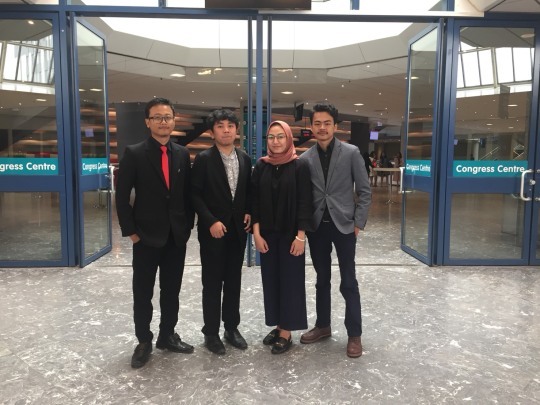
my hyperactive friend, J
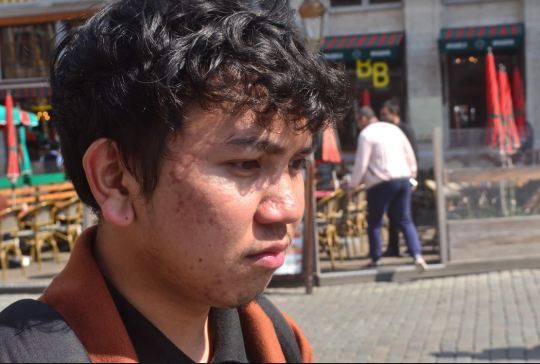
my wild but religious friend, Ali
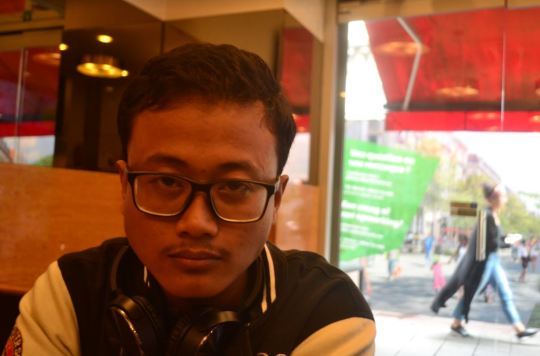
my grumpy bitch, Bella
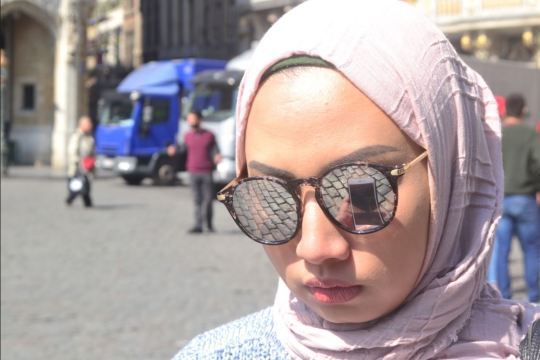
and of course me
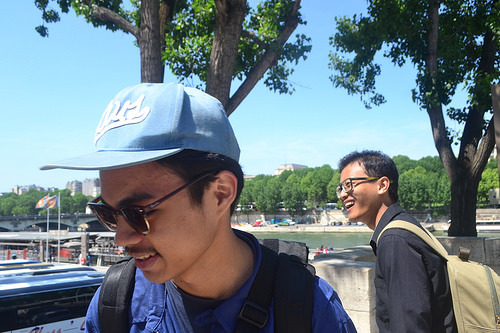
4/5 of us are selected from a very tight selection to represent Universitas Diponegoro in Euromun. With a year of preparation and well not that much time to meet and get to know each other because we have our own activity, we finally make it to Europe.
We went into separate flight. Me and Bella went there on Monday, J and Ali went there on Tuesday. too bad. It was around 10 PM from Soekarno Hatta International Airport and we went to Turkey for transit. Having a glass of coffee and a cig then straight to Schipol Amsterdam.

after we arrived, Bella and i store our luggage at the airport and we go straight to Amsterdam Centraal. Not surprised that the smell of weed everywhere. giting terus bosku!
We had a really nice Italian Pizza for breakfast. Strolling around Amsterdam was so much fun. It was unexpectedly warm there, and we wear a jacket. lot of jacket gosh
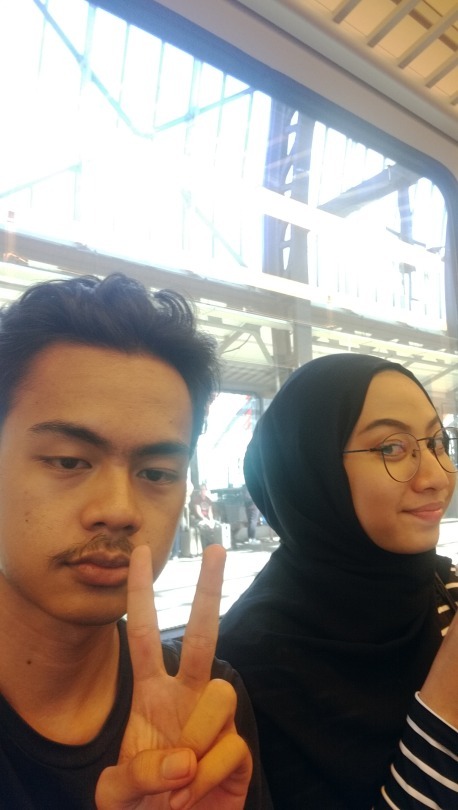
after strolling around centraal, we went back to Schipol to take our luggage and go to Maastricht. it’s a hell of a atmosphere. No traffic jam, very clean environment, and bikes everywhere. not a long after we arrived, we got picked up by our host parents there. Shout out to Mr. Untung and Mr. Adriyan!
the next day, Bella and I went for a walk in the city of Maastricht. It’s like a city for student, but sure it’s waaaay different from Tembalang riot city. We’re not actually walking but we ride bikes, just like locals.
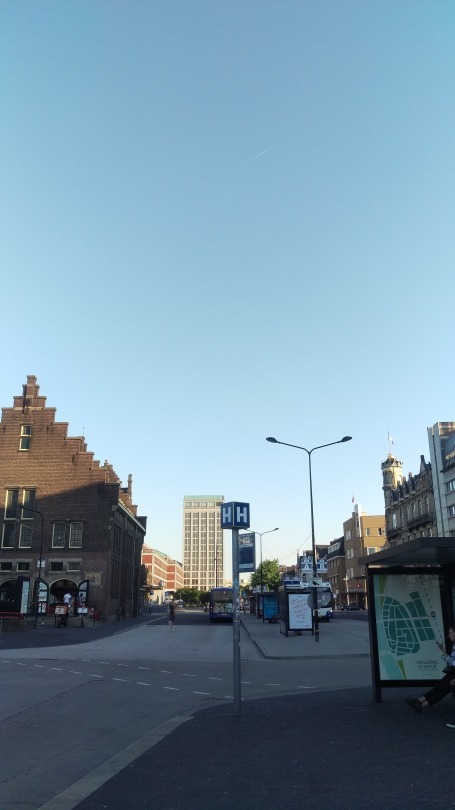
this place is lit. even thought there are less attraction than Amsterdam, this place it’s a good place to live.
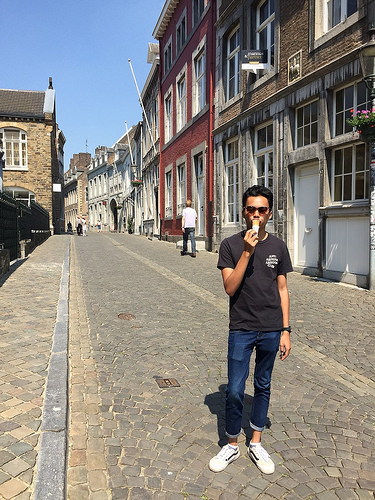
the conference start 2 days after we arrived. we gather all our stuff, research, but not our brain. kiddin’. it’s located in MECC. it’s a really good place for a conference, since it’s provide so many room that big enough to provide all the participant. I’ll be represent India in ECOSOC council under the topic of Globalization and gig of economy. I met a lot of cool person there from France, Germany, Netherlands, Spain, Switzerland, and even Israel. Surprisingly they’re so nice and very friendly to me even thought i have a very different background from Indonesia. Cheers to all of my friends there! hope to see you soon. #ecoshot
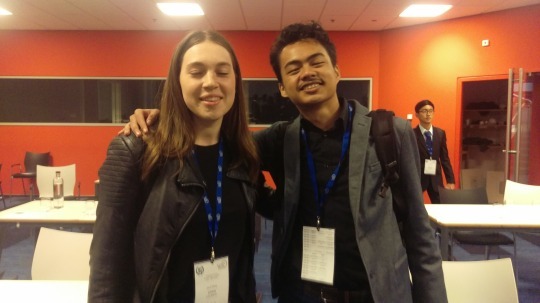
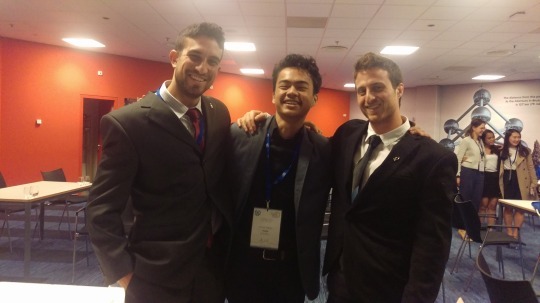
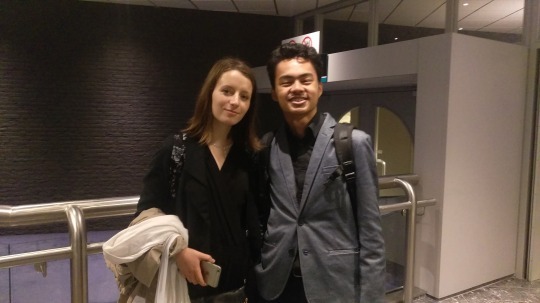
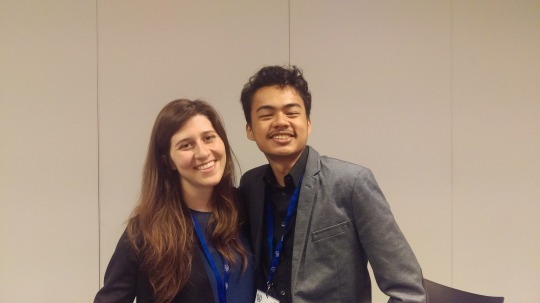
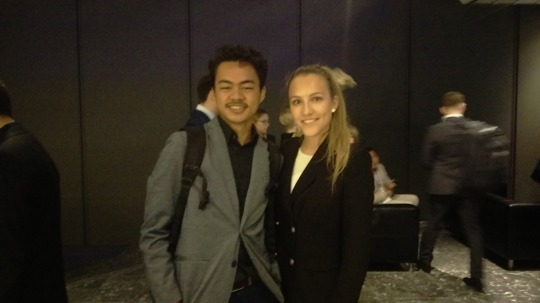
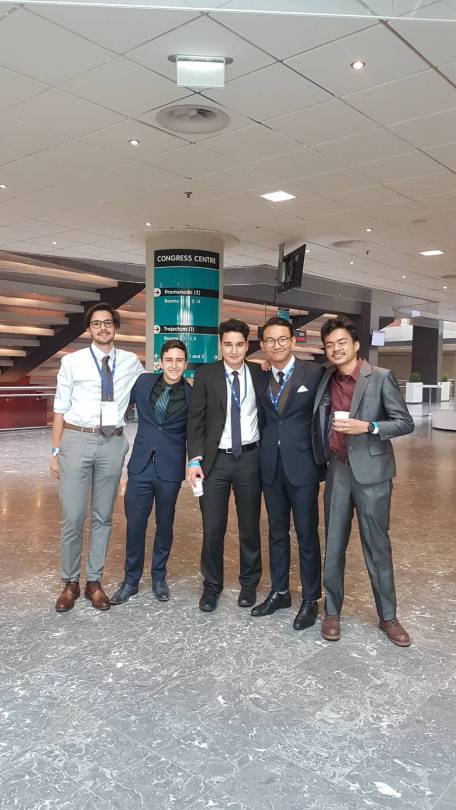
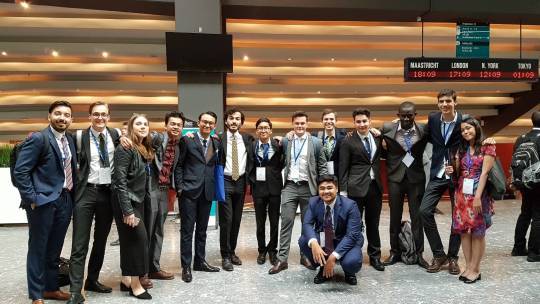
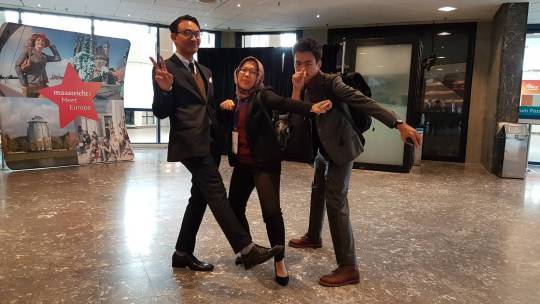
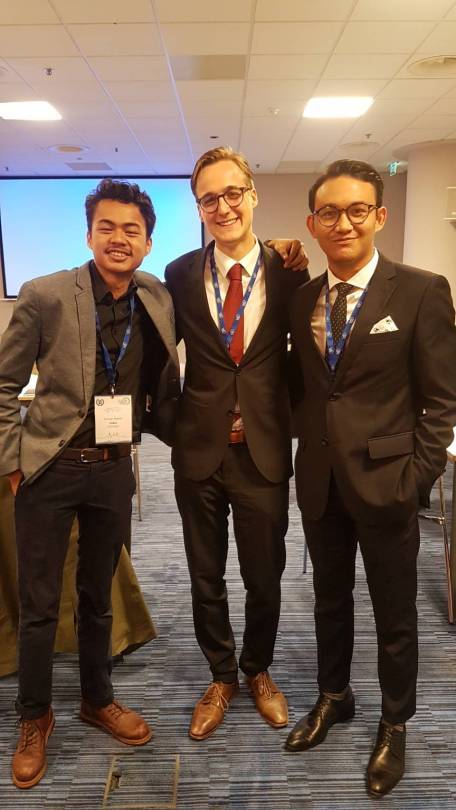
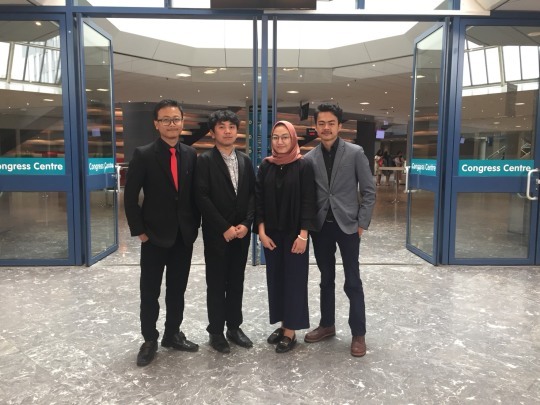
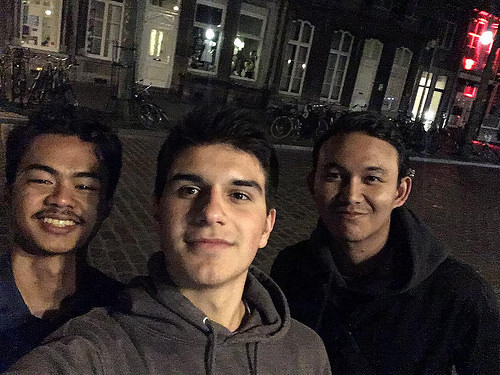
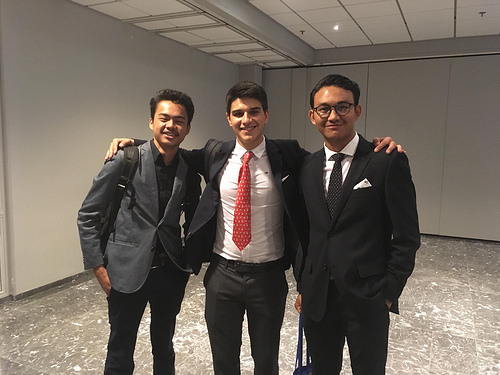
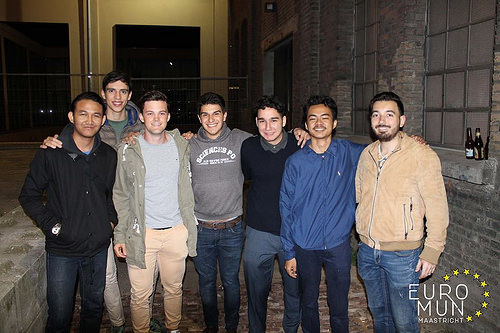
after all those exhausting day in the conference, we went to Paris. the funny thing is, we haven’t book any place to stay. But hey, where’s the fun part if we already plan everything correctly right? joke. it’s no fun at all.
we went to Paris by bus. but before that, we went to Belgium first because why not. Lots of chocolate there. too bad we went there while the avengers went by. all the roads its like on renovation, F!
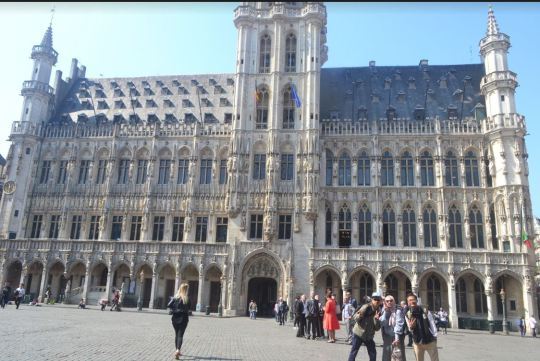
oh and we went to Comic Strips Museum. we met Asterix & Obelix, total classic. when we want to get back to the bus, we almost got left behind. We went to the wrong station and have no idea which train to take. after trying to figure it out, we finally make it literally on time. living on the edge huh?
so Paris. the city of love where everything is art, including steal things. Just like Jason Mraz album. there’s so many spot that we want to see, but 3 days and 2 night are not enough. So we only went to the mandatory places such as Louvre, Eiffel, Arc de Triumph and other shit. its one hell of a adventure.
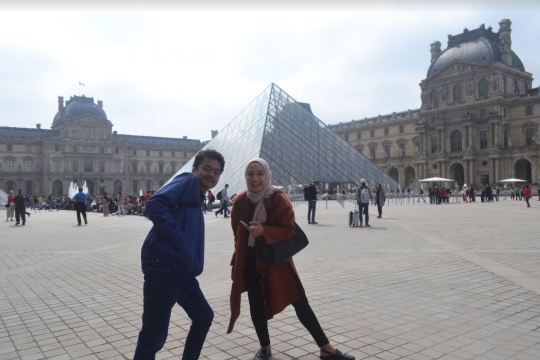
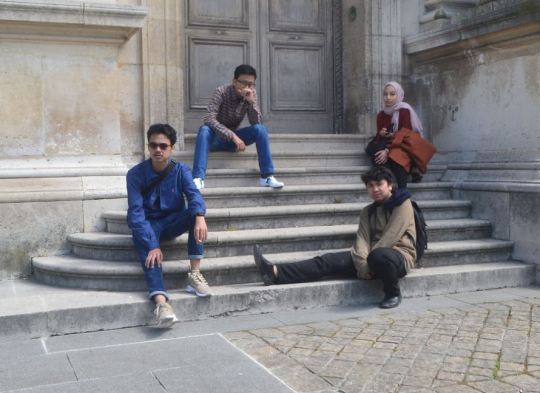
First on the list is Louvre. Because its the nearest and most reachable. There’s a lot of people there (no shit deto). We took a couple of shot and then we went to the nearest and one of the coolest cafe, Cafe Kitsune.
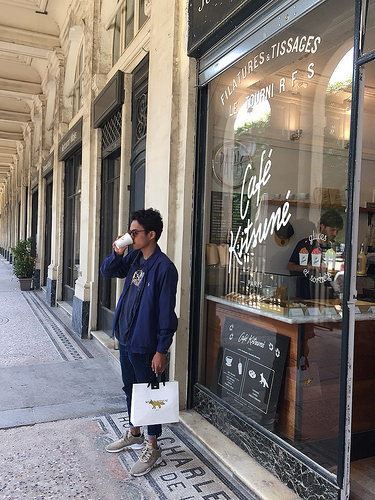
I even bought a mug! #kenaikanstratasosial #cheapestthingicouldafford
then we stroll to do some thrift
l̶i̶f̶t̶i̶n̶g̶ shopping. It’s kinda took time because it’s far. but worth the time. I got some Yankees tee for only 1€! what a bargain. then we had some kebab. safest food we could eat.
Tired of shopping, we went back to our list. We went to the Arc de Triomphe. its so crowded. Lots of car. Cooler version of Simpang 5 #semarangjugakeren.
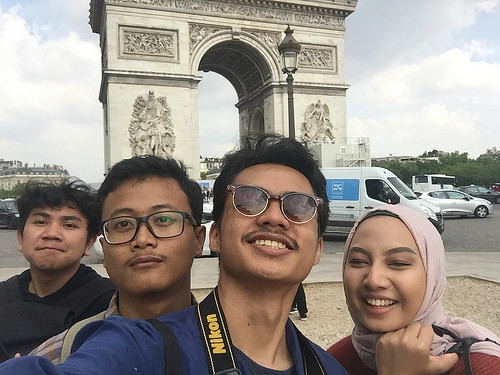
Enough taking picture and embracing it, We went for a religious trip to Notre Dame. it was a really good looking and ancient cathedral. Everyone was very friendly even though we are Muslim. There are a lot of terrorist attack that triggering bigotry, and yet the security of Notre Dame still smiling and say hi to us. There’s a preacher talking inside and also people attending for a regular religious activity, and yet it remind us its time to taraweh back in Jakarta hahaha.
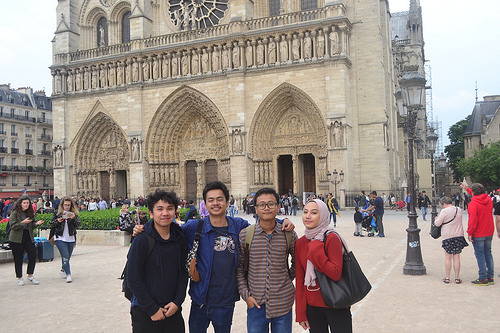
right beside Notre Dame, there’s a really cool river. And just so you know, that’s where Rattatoullie drowned and decided whether he want to act as a chef or just live his life as a rat. Yes. I know. Not important but still.
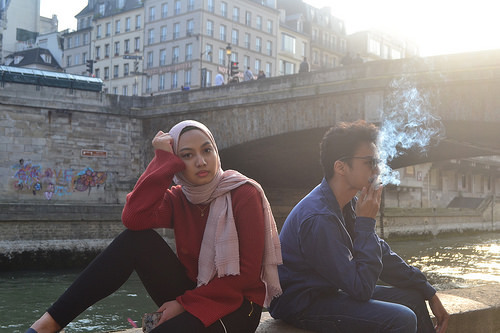
after that we went to the last spot. looking for a cool place to enjoy the sunset. the symbol of Paris. yup. where else. It’s the Eiffel Tower. we also meet several Indonesian there. It’s easy to recognize them. we arrived in Eiffel at around 7 pm, and the sun are not yet tired shining. The first thing we seek are toilet. The toilet are disgusting if you don’t really look. after we found the proper toilet, it was very modern and breathtaking. All automated thing makes us believe that one day the terminator will took over the world.
The Eiffel tower was amazing. lots of family, friends and also couple hanging out to enjoy the dusk. No soulmate, no problem. I still got my friends! #denialkampret
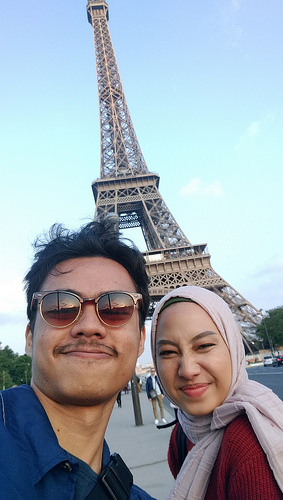
Eiffel at night are the best. All those cool lamps and the cold vibes are beyond amazing. Also with my old friend, Gudang Garam Kretek, the nights are perfect. We sit together, we gaze the star, we talk nonsense and enjoy the night like there’s no tomorrow.
after strolling from Paris, we went back to Maastricht. One funny thing that keep happen, we always get on the bus literally on time. Means that once we hop in, the bus drove away. No. That’s not a good thing.
It’s our last day in Maastricht. One more chance to live the fullest in here. No lol kidding. None of our friends from other Indonesian uni still here. So we just rest, looking for ticket to Frankfurt, Germany and go to the city for one last time. I know there are nothing there but still, Maastricht is an interesting place to discover.
we went to the bus station at noon. it was quite a long trip. we arrived around midnight with no f-ing clue which bus or train or any public transport we should take. sitting for a few minutes on the street, trying to figure out which one is our ride to Ginnheim. we’re staying at my aunt’s. Special thanks to Tante Sila & Om Jabrik. they also lead us (patiently) how to get there.
in the morning (its almost 12pm) we go to the city. we went to one and only place that we’ve been craving, Primark. There like a shitload of cheap with decent quality product that worth to buy. Wont hesitate to spent so much money there. Tired of shopping, we went to a cafe on top of a building. We can see the whole city from that point of view. what a way to spent the afternoon.
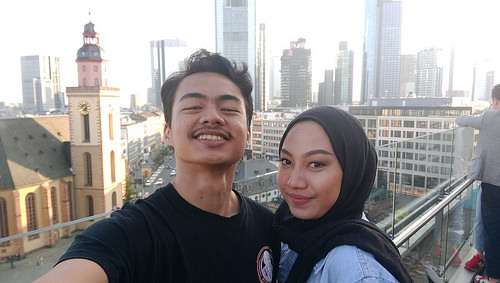
the next morning, we stroll to the city again. but its weekend, means that all the shop are closed. so, no shopping day. so we took a walk around the city. that day was a special day for frankfurt. the night before, Eintracht win against Munchen and gain victory for the German Cup since 1988. the whole city celebrating. drinking beer, marching around. everyone’s happy and surprisingly no vandalism.
later that day, we met Ale from Brawijaya to hang out. We also meet several Indonesian who live in Frankfurt. We hang out in a park enjoying afternoon with beers and fries. Also smelling other people smoke weed which is nice.
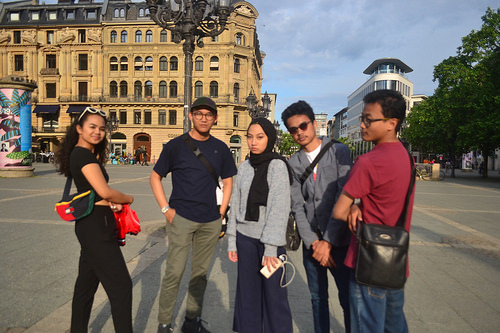
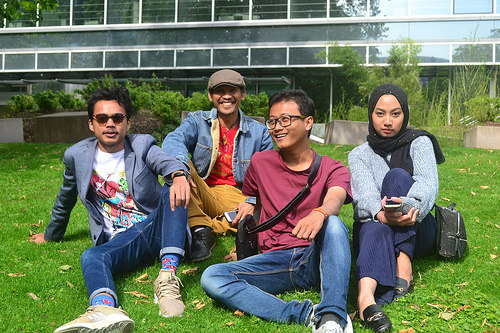
It was Ramadhan so we look for breakfasting. We went to Chinese restaurant. You know, no rice means haven’t eat. After getting fueled, we went to a bar to spend the night. it was real fun. and also cold. Never forget the cold part. We went back at 3 am. No more trams, subway and buses. Well we also cant walk tho. Strolling around for a while, thinking how to get back home, we finally manage to find one last bus that headed to Ginheim. fyuh
The next day we went to Rudesheim. Caca and Ale invited us. it was a really nice small town for a quick escape. Like Cisarua hahaha. It takes around an hour and half. We hop on a cable train. It has a wonderful view. the cable cara leads to Niederwald Monument. Strolling around Rudesheim feels like hanging out in Diagon Alley. its so chilling seeing people from young age to an elderly hanging out and dancing to a cheerful music.

After an exhausting day, we went back to Frankfurt. Catching for some dinner because you know, stomach asking for a refuel.
The next day is our last day in Frankfurt. it was Monday, means that all the store are open. Working days, but holidays for us. We go straight to the city, buying things we don’t need and spending money we don’t have. We split and go nuts for goods. We went back before dark, because later that night we need catch bus straight back to Amsterdam. We have our last dinner and saying goodbye to the Tante Sila and family. Time flies.
We also meet our local frankfurter for the last time before we hop on the busses. See you when we see you!
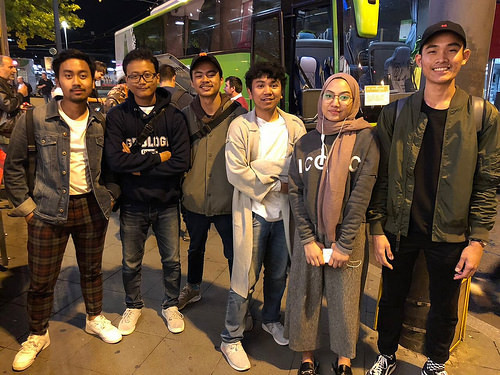
Earlier in the morning, we arrived in Amsterdam. we want to go to Amsterdam central to end our happy holiday. But shit happens. We bought the wrong public transportation ticket, so we can’t use it for the trains. farts. after that, we hop on the bus. Its a little bit detour but why not. Its a fancy busses and not mikrolet. The whole city of Amsterdam looks like a human size miniature. Very well coordinated. long story short, we arrived in the Amsterdam Centraal. We store our luggage at the train station and go straight to the city. Getting lost in Amsterdam for one last time.
First we need to get fuel. We stop on another kebab restaurant and have pizza for dessert. Every corner of Amsterdam smells like weed. which is wrong. and nice on the same time. Also, we look for several souvenirs to take back home. Funny things are, we only spent like only a days in Amsterdam and 16 days in Europe. Amsterdam its like Netherlands main attraction, but we don’t have times although we’re like 16 days here. There are also a lot of street artist who drew alll those vintage shops in a vintage building. Very classic. We also went back to the Red Light District for a quick stroll. Because why not right. We also want to visit Anne Frank Museum and explore the canals by boat. but we don’t have time and have a plane to catch. later that day, we went back to the airport and call it a day. Me, Ali, and Bella took a same flight. J have a solo flight. So long!
It was super amazing trips. Good friends, Good times, Good company. All leads to breathtaking memory.
ps: if you’re lookin for how i ended up with bella, just ask her. i dont even have any clue.
0 notes
Text
Venditti On the Socially Relevant, Inspirational Power of Green Lantern
This week’s “Hal Jordan and the Green Lantern Corps” #13 by Robert Venditti and V. Ken Marion served as an epilogue to the title’s “Bottled Light” arc, which saw Starro and Brainiac team up to conquer the planet Xudar, part of a grander scheme by Larfleeze to add the Green Lantern Corps to his collection. When the dust settled, the Lanterns emerged victorious, and this issue, titled “Heroes,” explored the Xudarian civilians’ view of a world rescued, as told by a survivor of the siege to her grandchildren, sixty Earth years in the future.
RELATED: Hal Jordan & the Green Lantern Corps Reads Like A Response to President Trump
Venditti and Marion’s story also gave an opportunity to refocus the concept of Green Lantern, delving into its themes of the triumph of will over fear and other less noble emotions. With all of that in mind, CBR spoke with Venditti about the issue, the idea of Green Lantern, and how current events and a reader’s perspective can affect how a story is read.
CBR: First, let’s go back in time a little bit, thinking about what Green Lantern means. In the Silver Age, Hal Jordan was chosen as Green Lantern because he was “without fear.” The modern equation is that Lanterns are “able to overcome great fear.” This change didn’t originate with you, but I’m wondering what you see as the fundamental meaning or value in this shift.
Robert Venditti: I think as a character, when you’re writing stories, you don’t really have a story without conflict. As much as we all love our heroes, we have to put them through the wringer in order to tell stories that are exciting and test their limits. I think if you have a character that is incapable of fear, it kind of takes the conflict out of it. Overcoming great fear, that’s something you can put the conflict into and also something that’s more relatable to the audience. We all know what it feels like to have fears and we know, hopefully, the triumphs of overcoming them, as well. I think that is really integral to who the Lanterns are and their concept in the modern DCU. And obviously the theme was very important to the issue, as well.
We didn’t see it this issue, but I also thought it was interesting that in the “Bottled Light” arc, the Sinestro Corps were teaming up with the Green Lanterns, a team up of will and fear. How does that play into the themes of “Green Lantern?”
You’re going to see a lot more of that in the next arc. This was kind of a breather issue between the two [arcs], where if you haven’t been reading the series up to now, you can read this, catch up on what the concept is and who the characters are and what’s going on, where we are in terms of story. And if you have been reading the series, there are a lot of teasers about what’s coming up, about future storylines that we’re going to do. And that’s not theoretical, some of that stuff is already executed in script and being drawn as we speak. These are actual events that are going to take place.
As far as them teaming up with the Sinestro Corps, one of the things I like to do with the “Green Lantern” series is — all the Green Lanterns are chosen because they have the ability to overcome great fear, and I think that there’s a tendency to lump all the Green Lanterns, not just the human Green Lanterns, as if they’re all the same. They’re all the same person, they all operate the same way. What I try to do with each of our four leads, which is Hal, John, Guy and Kyle, is not just show them overcoming great fear but also showing the differences in how they apply their willpower. Hal does it with a sort of gut instinct, hurling himself into harm’s way. There’s a boldness about him. John Stewart does it more through his strengths; he sits back, waits, gets all the chess pieces on the board and strikes at the right time. Guy is a person who will take every punch in the face he can take so that nobody else has to take them. These are all demonstrations of great will, and I think the same is true of the Sinestro Corps. Yes, they all wield great fear and are powered by fear in some way, but how is that different? We’ll come to see over the next few arcs as these two corps try to work together how fear operates differently for them and where that power comes from now that they’re being led by Soranik, the daughter of Sinestro, rather than the original Sinestro himself.
The narrator says something in passing in the issue that I thought was interesting, that most of the Green Lanterns hale from planets she’s never heard of, highlighting that these are strangers who are protecting people who are not their own. That’s always been in the Green Lantern idea but hasn’t been emphasized as much.
I wanted to tell a story that was a kind of ground-level perspective. So much of what we do in the series is told from the sky looking down, I wanted to do something from the ground looking up. We’re relating events in this issue that were told in the previous arc, but we’re telling them in a different perspective. I think we take for granted the diversity of the Green Lantern Corps. This is a police force made up of members of a vast and diverse universe. They’re officers from individual communities that come together to police everything as a whole. To see what it looks like from a ground level perspective, that is what I wanted to show.
I think that [issue artist] Ken Marion, this is first time on the series and my first time working with him, we really gave him a lot here. Like nine million characters, and creating a whole culture in the Xudar of the future and these things. He really did a great job with it.
As a little nugget, the character who narrates the story, Somar-Le, she actually makes her first appearance back in issue #9 when [Green Lantern] Rot Lop Fan creates a construct and hits the barrier of Brainiac’s bottle, and that disrupts the communication between all the little Starro spores. One falls off her face, she says, “I’m Somar-Le, has anybody seen my parents?”
We see that from her perspective this issue, when she tells her grandchildren about the siege. Do you see the story as a reminder of the aspirational role of superheroes, and the power of real-life heroes?
Yeah, absolutely, I would love for it to be viewed that way. Obviously, you don’t have to be a superhero to be heroic. This is a woman who is a grandmother. Her grandchildren don’t know much about her but she is imparting on them a life lesson that will teach them to have no fear and overcome our worst instincts in terms of rage and greed and all these other things. Each of us, I think we tend to look a lot toward history and the past for our heroes and I think that’s great, but our heroes are also present and right there. We have the opportunity to inspire our children and grandchildren in the way that hopefully our role models have done for us.
The Xudarians have been part of the Green Lantern mythos for ages, but what led you to set the “Bottled Light” story arc in this environment, with “Heroes” following?
One of the aspects of “Rebirth” that we’re really trying to tap into while pushing the characters and story forward is that we’re also embracing the long, storied histories and legacies of all these characters. In the Green Lantern mythology Xudar, going back to Tomar-Re, kind of embraces that. That was one reason I wanted to do it, but I also wanted to because we have Tomar-Tu, the son of Tomar-Re, as a current Green Lantern, and I want to, in addition to the four leads, focus on some of the alien races. This was an opportunity to, if I’m going to set it on a world, let’s set it on a world that one of these characters calls home and make it relatable that way. Have a mini-plot there with Tomar-Tu. And we aren’t done with his story yet.
I know you didn’t plan it this way, but this issue came out the week after the presidential inauguration and Women’s March. Some folks on both sides of that equation are likely to see a message here. Does viewing the story through this lens affect the message you were originally going for?
It’s an interesting question. I was in Atlanta last weekend for ALA [the American Library Association Midwinter Meeting]. We were downtown and there was a march that came through that was sizable, and it was a part of what was going on throughout the country. All these things are of the moment. For me as a writer, I try really hard to not go into any sort of story in a way that a reader would know what my point of view is on a topic. For example, “The Surrogates” is a story I wrote a long time ago. It’s about technology, and I have just as many people come up to me and say, “You must really hate technology” as say “You must really love technology.”
We all know it feels like when we experience a work of art, whether it’s a film or a book or what have you, and it feels like it should come with a hammer to beat yourself over the head with. Because the point of view is not that of the characters but whoever created the story. I always try to avoid that, because I want the audience to get lost in the story and relate it however they can to their own life and hopefully take something positive away from it.
This is a story I pitched to DC well over a year ago. It was meant to do a lot of things. In one aspect, I knew we were going to have a fill-in issue here, a breather between two arcs. I wanted it self-contained. In another aspect, some of the earliest comics I read that inspired me to want to be a writer myself were Kurt Busiek’s “Astro City,” which is very much an on the ground, looking up at the sky view of superheroes. So I wanted the point of view to be something that was in that tradition.
But, you know, the moment being what it is, when you read the issue… I don’t know how to articulate this! [Laughs] It can convey these things. But I don’t think that’s bad. As a writer, if I can tell a story that can make people think, or inspire them, or be positive in some way, that’s what it’s all about.
The post Venditti On the Socially Relevant, Inspirational Power of Green Lantern appeared first on CBR.com.
http://ift.tt/2kt6Pd2
0 notes